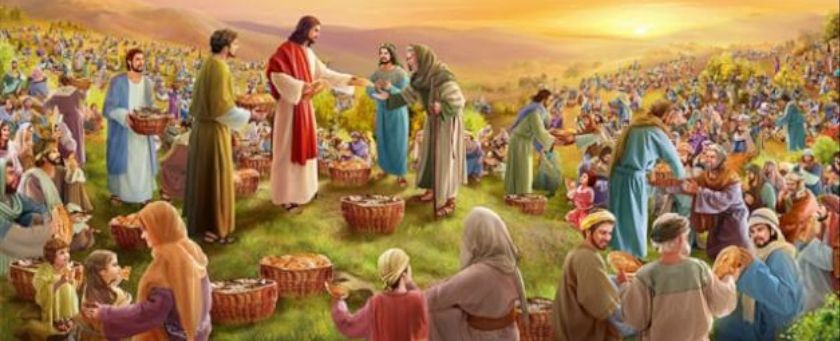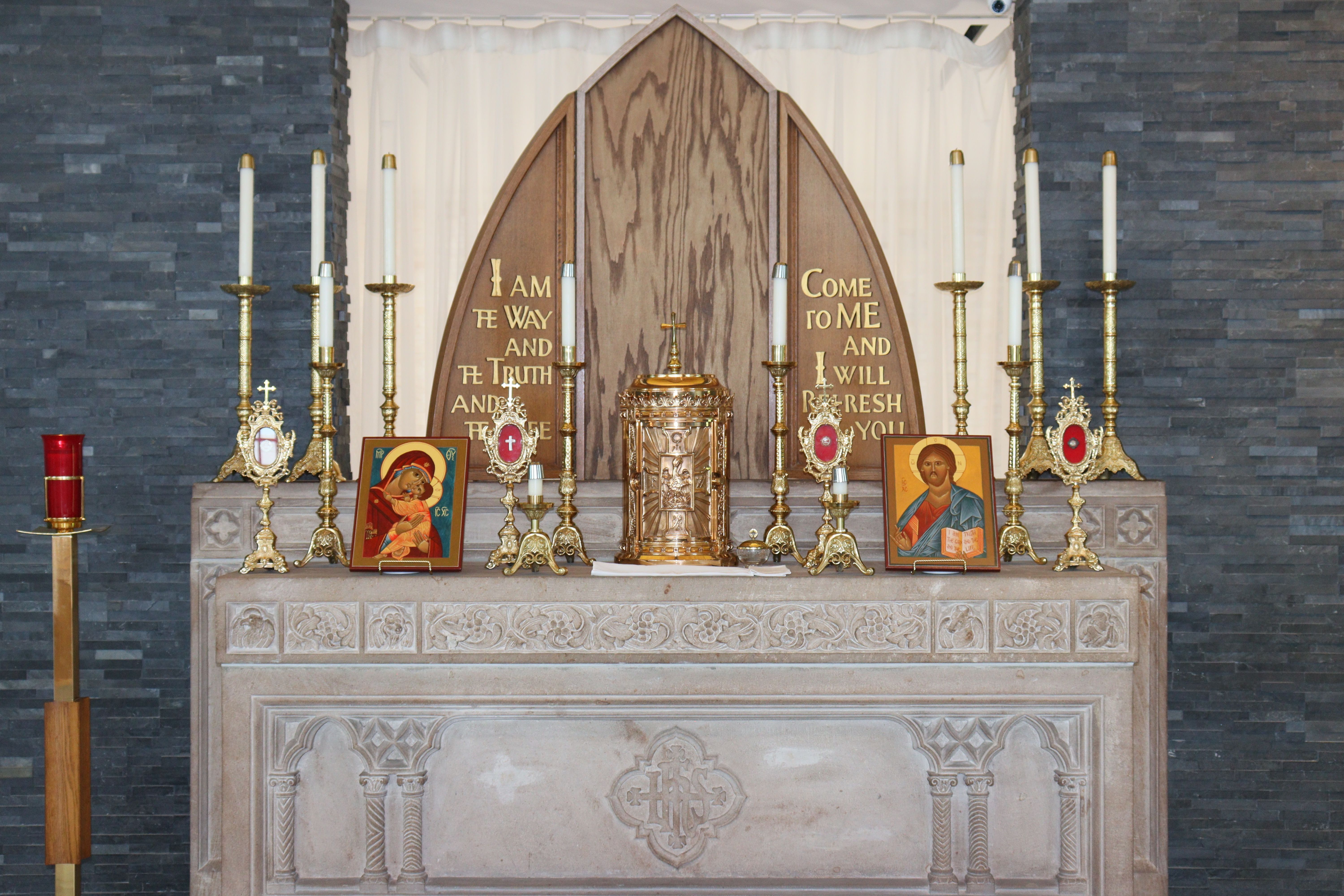Jesus Feeds His Followers, He Gives Us Our Daily Bread
Seventeenth Sunday in Ordinary Time, Year B

(Audio recorded live, 25 July 2021)
Readings:
2 Kgs. 4:42-44; Ps. 145; Eph. 4:1-6; Jn. 6:1-15
Over the next few weeks we will be hearing passages from the sixth chapter of the Gospel of John. This chapter is significant because it contains John’s account of the multiplication of the loaves as well as the Bread of Life Discourse. I would invite everyone to dwell with these readings throughout each week, especially as we adore our Blessed Lord in the Eucharist and in his new dwelling place atop this altar of repose. I find it no mere coincidence that the completion of this altar project would happen the week the Gospel has us focus on the Bread of Life. With our God, nothing happens by accident. So, let us take a closer look at the way in which God weaves the tapestry we call salvation history.

In our first reading, we hear how the prophet Elisha performs a miracle of multiplication, saying, “They shall eat and there shall be some left over.” In the Old Testament, Moses sets forth the criteria to determine if someone is in fact a prophet. Moses says, “[I]f a prophet speaks in the name of the LORD but the word does not come true, it is a word the LORD did not speak” (Dt. 18:22). If we apply this test to Elisha, what can we conclude? The text provides us the answer: “And when they had eaten, there was some left over, as the LORD had said.” Therefore, we may conclude that Elisha is indeed a prophet of the LORD.
Our psalmist reminds us, “The hand of the LORD feeds us; he answers all our needs.” This includes giving us our daily bread, which is what we are here to receive. It is also what unites us as the People of God, brothers and sisters in Christ, children of the Father. Whenever we gather here, we are not alone; whenever we gather here, we are united in one Lord, one faith, one baptism; whenever we gather here, we receive Christ into our hearts. It is Christ who calls us, who unites us, and sanctifies us, making us holy. He does this on behalf of the Father, who is over all and through all and in all. With our God, nothing happens by accident.
Looking to our Gospel, we hear of the miracle Jesus performs of the multiplication of the loaves and fish. This passage is packed full of images, so let us unpack some of them. First, the location is across the Sea of Galilee up on the mountain. Jesus, his disciples, and his followers are in Israelite territory, and they are on a mountain. Why a mountain? Because in the ancient world, mountains were the dwelling places of God. It is no accident, then, that Jesus chooses to perform this great miracle on a mountain. The dialogue between Jesus, Philip, and Andrew is a test to see where they were on their journey of faith. By their answers, we realize that they still have a very worldly perspective. It would cost too much, or what little they do have is not enough to feed such a large crowd. What lesson do you think Jesus wants to teach them?
A couple weeks ago, we heard in the Gospel of Mark how Jesus sent his disciples out two-by-two instructing them to “take nothing for the journey but a walking stick—no food, no sack, no money in their belts.” Yet, here they are concerned about their lack of money and food. Again, the psalmist reminds us, “The hand of the LORD feeds us; he answers all our needs.” So, Jesus has the people recline on the grass, which might remind us of another Psalm: “The Lord is my shepherd, there is nothing I shall want. Fresh and green are the pastures where he gives me repose…” (Ps. 23). Then Jesus takes the loaves, gives thanks, and distributes them to the people, and also as much of the fish as they wanted, such that everyone had their fill. The baskets of fragments left over show us how abundant this miracle was; it could also be an allusion to the faithful remnants of the twelve tribes of Israel.
But, the Israelite’s faith is also still developing. They see in Jesus the fulfillment of the LORD’s promise to Moses: “I will raise up for them a prophet like you from among their kindred, and will put my words into the mouth of the prophet; the prophet shall tell them all that I command” (Dt. 18:18). This is why the people say, “This is truly the Prophet, the one who is to come into the world.” They wanted to make him an earthly king, but that is not why Jesus came. Instead, he has come to show us the way to the Father. And that way is one of all humility and gentleness, with patience, bearing with one another through love. At the Last Supper he says, “the Son of Man did not come to be served but to serve and to give his life as a ransom for many” (Mk. 10:42-45), and “No one has greater love than this, to lay down one’s life for one’s friends” (Jn. 15:13).
Jesus is the Suffering Servant, the Good Shepherd who hands himself over for the sake of his flock. He models this for us in today’s Gospel. So, as we continue to reflect upon the great mystery of our salvation, let us give thanks for the sacrifice of Christ, who humbled himself to show us the way to the Father. And may the communion we share today, be a continuation of the overflowing miracle of the multiplication of the loaves, that this, our daily bread, may nourish us, strengthen our faith, and lead us to everlasting life.





Share this post
Twitter
Facebook
Pinterest
Email